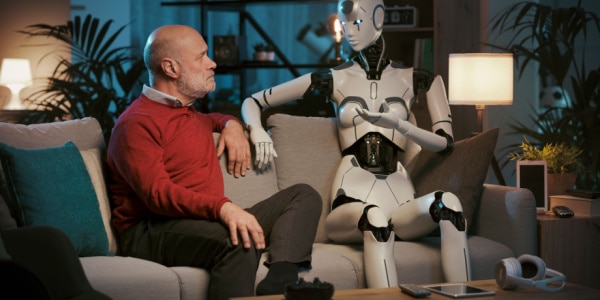What Seniors Need to Know About the Future of AI

You’ve probably been hearing quite a bit about artificial intelligence, or AI, in the media lately. AI can be a tricky, scary topic because there are so many unknowns right now. And, because the technology can be difficult to explain, understanding what is and isn’t true about AI can be confusing.
At the same time, you’ve been aware of AI for years. We’ve seen decades of movies speculating on what an AI takeover might look like. From 2001: A Space Odyssey, War Games and Terminator to The Matrix and I, Robot, our fascination with AI has spanned decades. The difference is that in 2023 we’re closer than ever to living side-by-side with this technology. So if you’re a bit wary about advances in this field, you’re not alone!
What exactly is AI?
First, what counts as artificial intelligence? Broadly speaking, AI is a system that learns and adapts over time. For example, facial recognition software is considered AI. As the program sees new faces, more information is gathered and the results that are returned improve. Since AI is so flexible, the technology is found in a wide variety of programs today—even those you might not expect. A few more examples of AI are
- self-driving cars,
- automated investing systems,
- smart assistants (like Siri, Google Now and Alexa),
- robot vacuum cleaners, and
- virtual travel booking agents
There are plenty of other automated systems that might feel like AI, but aren’t. All apps process information and most do so without using machine learning. For example, the chatbots used for customer service aren’t AI. Also, the targeted advertising that shows you products you might be interested in and programs that are just processing numbers (like a tax preparation software) aren’t really AI, either.
ChatGPT and why AI is in the news
Reading the list above might make AI seem like nothing new. And in many ways, it’s not. Artificial intelligence and machine learning have been impacting our everyday lives for some time. So why is so much of our attention on this technology right now?
Just like Hollywood, scientists, academics and researchers have been thinking about the impact of AI on humanity for decades. In 1950, Alan Turing created The Turing Test, a series of questions designed to determine whether or not a machine can fool a human into believing it’s another human. The reason you’re seeing AI in the news lately is because a computer application called ChatGPT passed The Turing Test in December 2022.
Although still only in the development phase, ChatGPT is one of the most advanced AI systems ever released. And, it’s free to use! The app can write cover letters, emails, essays, articles, reviews, scripts and much more, leading some users to worry about the impact on humans.
Of course, keep in mind that ChatGPT uses information gathered from around the internet to create content, and the results often sound credible without actually making sense.
Is there something to worry about?
A few of the concerns around AI are the ability to plagiarize content, whether these apps will impact the livelihoods of humans and the ethical question of allowing AI to make decisions that impact real lives. (You may have seen stories around AI approving Medicare Advantage applications.)
On the flip side, many users enjoy the powerful features of AI without worry. No one can be sure what the ultimate impact of AI will be. But the ever-increasing presence of AI in our digital landscape is certainly launching quite a few important questions and impactful conversations.
How will AI affect seniors?
Because AI includes such a wide range of applications, you’re probably not going to be able to avoid using it. You might even find communicating easier thanks to chatbots answering simple questions or feel more secure thanks to a wearable device that responds to falls and other emergencies. Learning about topics like finance, technology and current events can be more accessible using AI to navigate the information. Or maybe you simply enjoy chatting with an AI to find new hobbies and activities to enjoy in retirement.
Some of the latest AI products are even specifically created to make seniors’ lives easier, including interactive devices like the Alexa Together. This tool allows family members to interact remotely and support seniors who are living independently.
AI can also impact your health care–both in the ethically tricky uses we mentioned above and in positive ways that make your life easier. Imagine if your smartwatch monitored your health data throughout your daily activities and suggested new healthy habits to improve your quality of life.
As programmers grow their capacity to create these types of systems, AI will pop up in even more of the technology we use every day. But, rest assured, we’re not at risk of a movie-style AI takeover quite yet. Of course, we’re still figuring out how AI will impact our society and culture so getting clear on the legal and ethical issues AI presents remains necessary.
So, although you don’t need to worry about a robot apocalypse just yet, you do need to be aware of where and how you receive important information!
image credit: shutterstock/Stock-Asso
- How Medicare Advantage Plans Cover Seniors’ Vision, Hearing, and Dental Needs - October 29, 2024
- 2025 Medicare Part D Changes: How to Save on Prescriptions - October 25, 2024
- Everything You Need to Know About the 2025 Medicare Changes and How They Affect You - October 21, 2024

